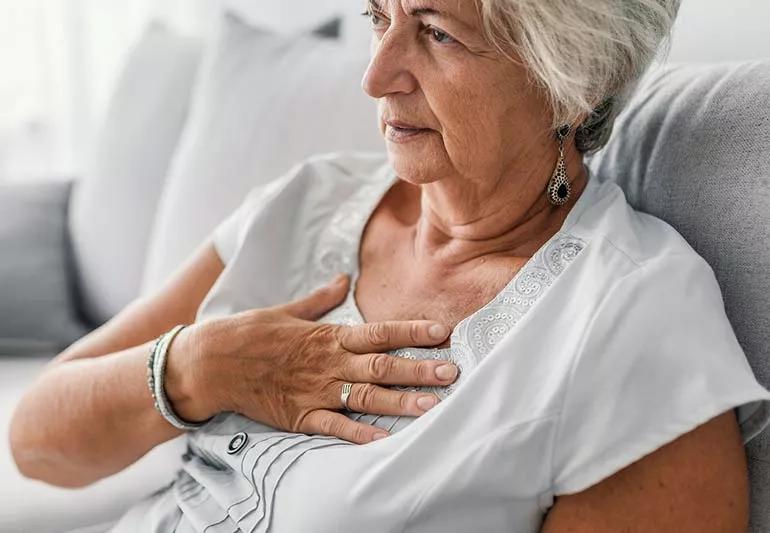Time can light the match on that fiery feeling in your chest, but there are ways to find relief

Image content: This image is available to view online.
View image online (https://assets.clevelandclinic.org/transform/a11ae104-22e2-47f1-a94c-6a3acf7dce3f/person-Hand-Chest-Heartburn-997800490-770x533-1_jpg)
Elderly person on couch with hand on chest suffering from heartburn.
There was a time when a belly-buster breakfast or late-night pizza went down easy. But over the years, it seems something changed inside you … and now those meals regularly come with a side of heartburn.
Advertisement
Cleveland Clinic is a non-profit academic medical center. Advertising on our site helps support our mission. We do not endorse non-Cleveland Clinic products or services. Policy
That fiery feeling that moves up your chest can become a much more frequent issue as you age. So, why is that a later-in-life thing?
Let’s find out from gastroenterologist Claire Beveridge, MD.
Heartburn isn’t just a gift that comes with more birthdays. It can happen to anyone at any time during their life. For proof, check out these statistics from a global study on chronic heartburn in 2019.
The report shows that nearly 784 million people around the world experienced recurring heartburn, or gastroesophageal reflux disease (GERD). That roster even includes school-aged children.
But case counts clearly show that incidents of heartburn rise with age. Here are four reasons why:
Muscles all around your body tend to weaken as you grow older — and that includes one that’s critical for preventing heartburn.
The muscle is essentially a valve known as the lower esophageal sphincter. Think of it as a gatekeeper between your esophagus and your stomach. It opens to let food you eat enter your stomach and then tightly shuts to keep it there.
“If that muscle weakens, it can have trouble keeping food and liquid where it belongs in your stomach,” explains Dr. Beveridge. “And when those contents break through and come back up into your esophagus, that’s when you feel heartburn.”
Advertisement
Most people add pounds as they add years to their age. Carrying extra weight can increase your chances of a meal ending in heartburn, says Dr. Beveridge.
One study found that the risk of GERD can double if your body mass index (BMI) reaches an unhealthy level. A larger waist size also can be a factor in whether you experience frequent heartburn.
“Extra weight can push down on your stomach, which creates pressure that helps push the food back up into your food pipe,” she adds.
Aging can bring health issues that lead to the need for medication, and those pills can light the match for heartburn. “Some medications can relax the esophageal sphincter, which makes that seal less tight,” notes Dr. Beveridge.
The list is extensive, too, ranging from over-the-counter pain relievers to antibiotics to blood pressure medications. Talk to your doctor about your options if certain medications seem to give you heartburn.
By the time you reach the age of 60, there’s a more than 50-50 chance that a hiatal hernia appears on your medical chart. It’s a condition where the upper part of your stomach pushes up into your chest cavity.
There’s a much-studied connection between hiatal hernias and GERD. It appears that larger hiatal hernias increase your risk of frequent heartburn.
Want to keep those heartburn flames from igniting at any age? Try these tips.
Advertisement
An occasional bout of heartburn is bound to happen. (Taco Tuesday can take a toll, right?) In those instances, an over-the-counter antacid — examples include Tums®, Rolaids® and Maalox® — or an H2 blocker, such as Pepcid® or Tagamet®, may offer some relief.
Now if you begin treating antacids as a regular after-meal dessert, it’s probably time to talk to your healthcare provider, says Dr. Beveridge. They may suggest a proton pump inhibitor such as Prilosec® or Nexium® to help control your GERD.
“Medications can play a role in terms of controlling heartburn,” she continues. “For proton pump inhibitors, they work the best if you take it on an empty stomach and eat something 30 to 60 minutes later.”
Reach out to your doctor if your heartburn occurs regularly or begins disrupting sleep. Swallowing issues that accompany heartburn also should be addressed immediately. Ditto for signs of bloody stool, unintentional weight loss or if heartburn first rears its head when you’re over the age of 60.
Heartburn symptoms aren’t always caused by acid reflux, after all. In less common cases, the symptoms can be a sign of:
Advertisement
“The majority of the time, though, heartburn is related to acid reflux,” says Dr. Beveridge. “It can usually be taken care of with lifestyle changes or medications.”
To hear more on this topic from Dr. Beveridge, listen to the Health Essentials Podcast episode, “Tips to Extinguish Heartburn Pain.” New episodes of the Health Essentials Podcast publish every Wednesday.
Advertisement

Sign up for our Health Essentials emails for expert guidance on nutrition, fitness, sleep, skin care and more.
Learn more about our editorial process.
Advertisement
There isn’t any scientific proof that the tangy liquid offers relief for GERD symptoms
Tips for reducing nocturnal heartburn
The caffeine and natural acids in coffee may trigger acid reflux, but there are ways to lessen the effects
Wait a few hours, then start with water or ice chips, graduating to clear liquids and then, soft, bland foods
Eating a healthy diet, reducing stress, and focusing on exercise and sleep can help keep your digestive system in top form
People with an inflamed esophagus may also have other conditions that cause a nagging, persistent cough
Allergies, indigestion and the effects of gravity can all mess with your nose at night
Frequent burping can be many things — but likely not cancer
Although it could be used as a moisturizer, this new trend is not recommended
Communicating clear limits helps protect your time, energy and emotional well-being
High cholesterol can be genetic, but testing and treatment can lower your heart disease risk